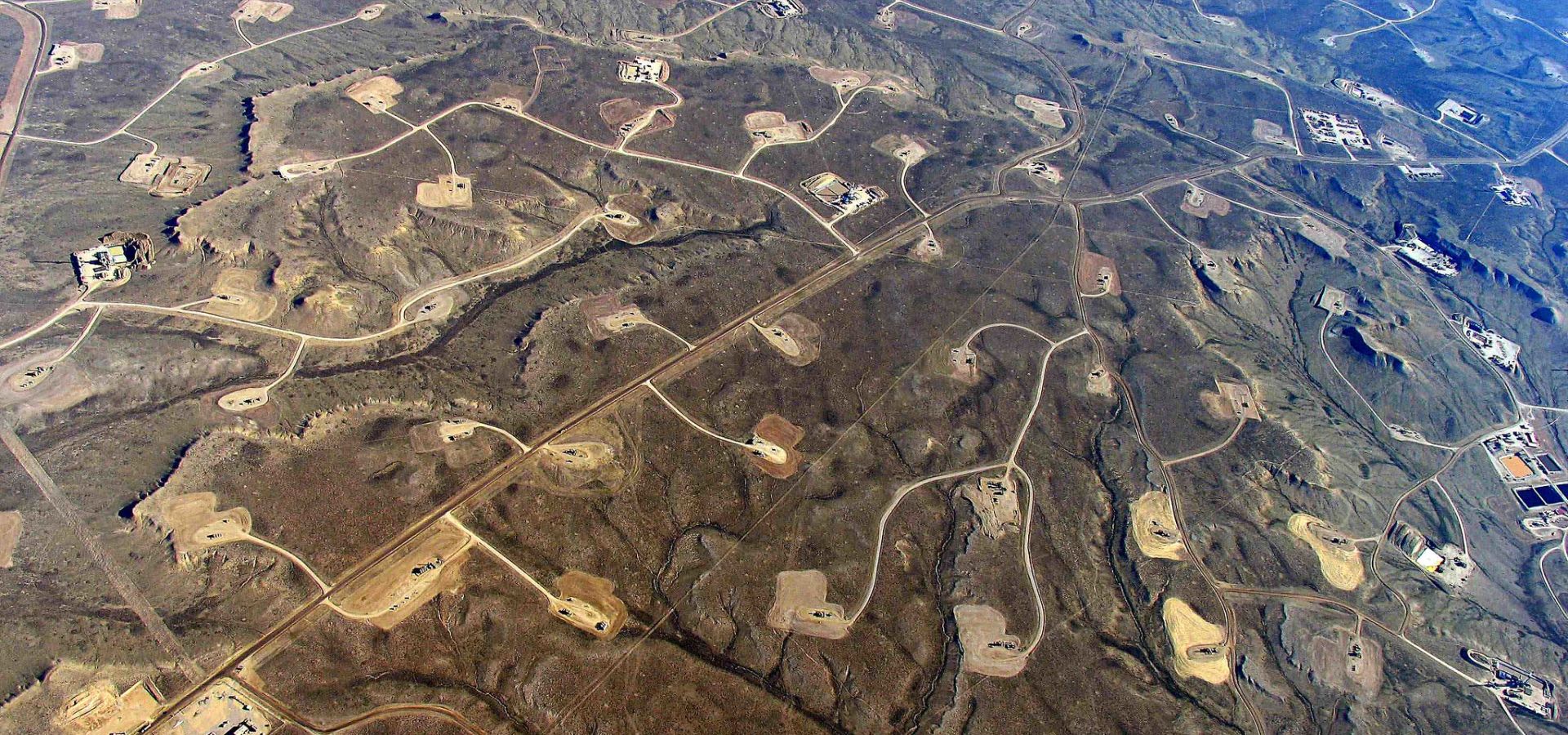Faced with dwindling oil reserves, Columbian politicians are worried about energy security and state funds. The country is looking into whether it will allow fracking if it’s ‘sustainable’ – ignoring the possibility of expanding renewables instead, says Rebecca Bertram.

In areas where shale-drilling/hydraulic fracturing is heavy, a dense web of roads, pipelines and well pads turn continuous forests and grasslands into fragmented islands (Photo by SFU – Communications & Marketing, CC BY 2.0)
Colombia has long been a thorn in the side of those fighting global warming due to its global coal production. With its 5.4 trillion tons of proven coal reserves, the country is the world’s fourth largest coal exporter, after Australia, Indonesia and Russia. Now, Columbia’s climate activists are increasingly focusing on a new environmental challenge: fracking.
Frack the future
In May of this year, the Colombian House of Representatives approved the President’s National Development Plan, a four-year plan that lays out the government’s policies.
Much to activists’ dismay, this includes a measure that allows for the country’s Energy Ministry to begin studying whether fracking offers a realistic promise for Colombia’s energy future. The plan calls for the government to define pilot projects and identify zones where this unconventional oil and gas extraction will be authorized. At the same time, it has given rise to a lively public debate over the method’s ecological implications.
The interest in the topic is not new to Colombian politics. In 2014, the previous government had laid down strict fracking standards both for the national and the communal level, resulting in large part from considerable public concern over the environmental risks and impacts of fracking on local ecosystems and water levels. While first permit auctions were held, no fracking permits, however, were ever issued. Some companies accused the government of insincerity for having first auctioned permits for fracking but then holding back the environmental permits needed for them to go ahead.
Today, pressure on Colombia’s energy sector is growing as the country’s oil reserves are shrinking and gas from fracking seems to offer a way out. President Duque himself has called for fracking to prevent Columbia from becoming an energy importer and thus has revived the debate. His government estimates that fracking could lead to a tripling of Colombia’s proven and extractable oil and gas reserves. More specifically, fracking would extend the country’s gas reserves for another 30 instead of 11 years, and oil reserves by 15 instead of 7 years. The government, however, is not limiting its argument to energy prospects. It also claims that the money obtained by the state would help finance the peace process, better education and poverty reduction programs.
Lessons learned from the US
Columbia wouldn’t be the first country to go down this road. The United States fracking boom started in 2006 and turned the country into a net energy exporter. Proceeds from fracking, however, neither enlarged public budgets nor helped support social programs due to the difference between Columbia and the US in the regulation of ground rights.
In the United States, landowners directly negotiate with energy companies without any state intermediary. In Colombia, the state manages all natural resources and therefore is the sole authority for issuing fracking permits, even on privately owned land.
Yet environmental concerns need to be at the heart of the debate. A recently expert commission has called for the national government to conduct a holistic oversight role of pilot projects, with particular attention to health and environmental implications for local communities. Only with their full consent should projects be allowed to make it past the pilot stage. And strict observation of environmental regulations and monitoring rules should be ensured at all stages of extraction.
‘Sustainable’ fracking?
The Columbian energy company Ecopetrol, which intends to invest up to $USD 500 million in the fracking industry over the next five years, will now have to prove the case for sustainable fracking in the country.
Ecopetrol’s task is clear: the company must demonstrate that fracking is actually free of severe environmental hazards – a daunting task, since never before has this been attempted, let alone proven. The company is launching pilot projects in strategic geographic areas, such as the Middle Magdalena Valley, in the north-central parts of Colombia, where local communities are already acquainted to the energy industry and less prone to the “shock” of hosting it in their backyard.
There is, however, one major problem with Colombia’s plans: while the government recognizes the environmental hazards of fracking, it totally neglects the effect of increasing greenhouse gas emissions on climate change. Fracking sets free up to 40-60 percent more methane, a particularly potent greenhouse gas, than conventional natural gas wells and uses huge volumes of water. While it is true that Colombia today only marginally contributes to global greenhouse gas emissions, the country is highly affected by a changing climate. For example, in 1990, Colombia had the fourth largest water reserves in the world, by 2017, it ranked 24th. The World Economic Forum estimates that by the middle of this century the country could face severe water shortages.
In other words, Colombia seeks to fill the gap of its dwindling oil reserves with yet another dirty fuel. Instead in cleaner alternatives like wind and solar, and electrifying most of its economic sector would be a real breakthrough in the country’s energy security. Colombia’s fracking strategy stands out in trying to address local environmental hazards. But it does not take into account the bigger climate dangers which in the end could threaten the very local communities that strict fracking regulations are aiming to protect.